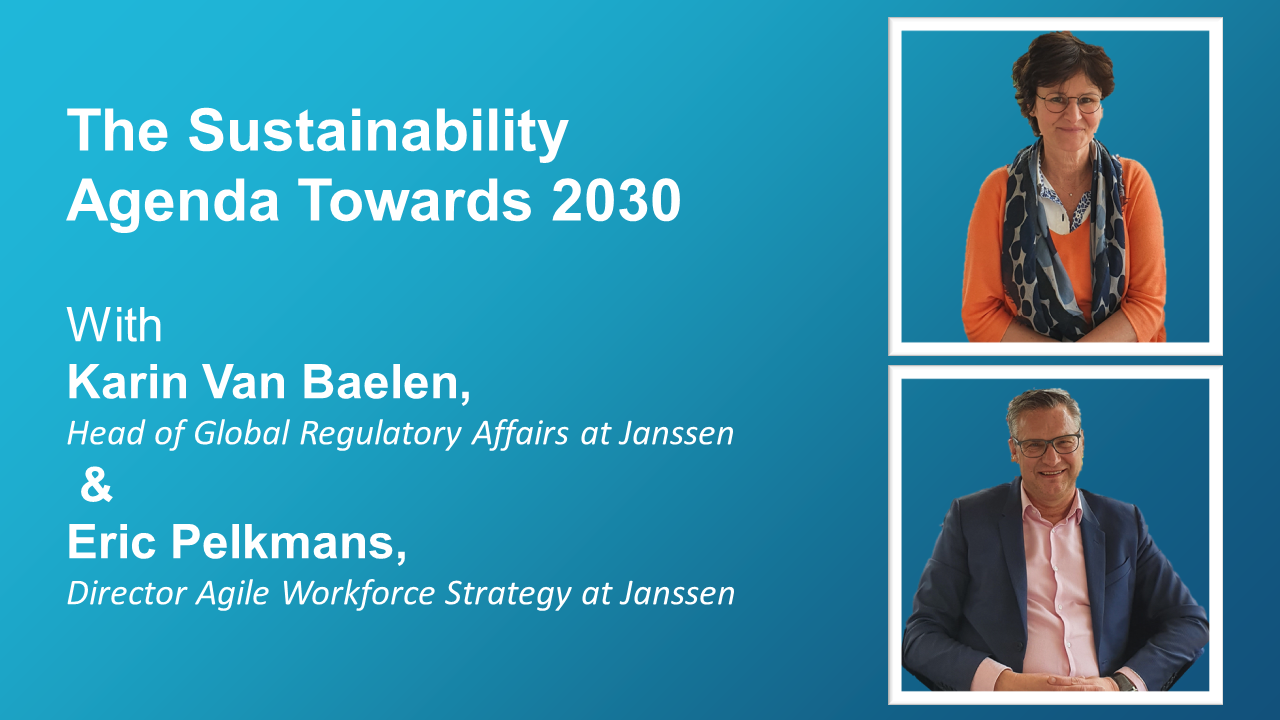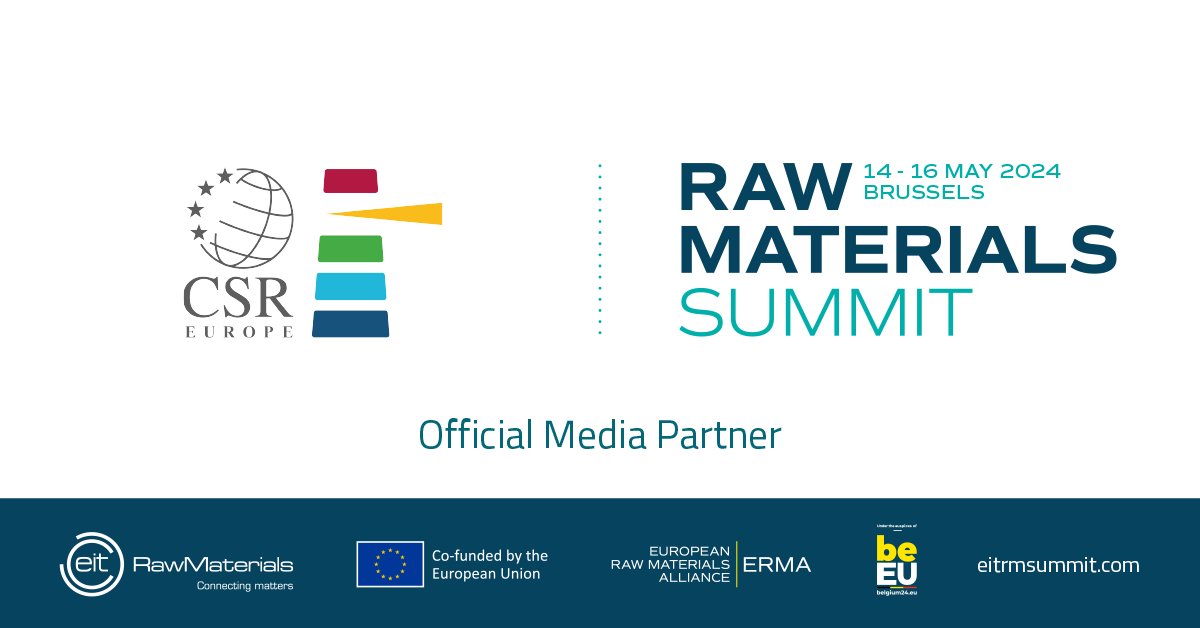Building Bridges to Ethnic Diversity, an interview with Karin Van Baelen and Eric Pelkmans, Janssen
The European Union has set a clear direction for the future of Europe with the Green Deal and the NextGenerationEU programme: if we want to overcome the existential threat posed by climate change and reach the targets of the Paris Agreement, we need to transform our economies and societies and design a Europe that works for everyone.
Companies themselves, and also the financial markets, have embraced climate goals and sustainability requirements more than ever before.
For an organisation like CSR Europe, which has integrated sustainability in its core mission and DNA for more than 25 years these are important evolutions.
To celebrate the European Diversity Month 2022, we talked with Karin Van Baelen, Head of Global Regulatory Affairs, and Eric Pelkmans, Director Agile Workforce Strategy at Janssen, Pharmaceutical Companies of Johnson and Johnson, about the challenges faced by companies in fostering an ethnically diverse and inclusive working environment and the breakthrough pilot project Business Uniting Talents (BUT) 2030. Both are very active when it comes to Diversity, Equity, and Inclusion for Janssen in Belgium, as Sponsor and Project Lead respectively.
Building upon the learnings and tools developed in BUT2030, CSR Europe will continue this journey with the launch of a European Collaborative Platform. On the 10th of May, we will present the set-up of the platform and our 2-year plan to advance on and promote cultural inclusion and diversity in the workplace. Companies that want to lead and engage in diversity and inclusion are invited to attend the event.
The interview is part of the blog series “The Sustainability Agenda Towards 2030”, our monthly interviews with CSR Europe’s Board Members and Sustainability Leaders. Together we shed light on key CSR challenges of our time and how leading companies are turning threats into opportunities.
Where did Janssen start to approach the topic of ethnic diversity?
Karin Van Baelen: Johnson & Johnson and its pharmaceutical companies Janssen have a long history in driving Diversity, Equity & Inclusion (DEI). Led by Our Credo and the global DEI strategy, we strive to be a diverse and inclusive company where everybody can be their authentic selves; we create the space and environment where each one of us belongs. Over the last decade, the scope of our DEI-related work has substantially broadened, from gender to many other aspects such as age, LGBTQ+, mental health and diverse abilities, and also ethnic diversity.
At the time, we were struck by the gap between the number of people with migration background in the Belgian community, especially in big cities, and the number of Bachelor/Master level young talents hired into companies, including our own. We wanted to be a frontrunner of the needed change. We know diverse teams will strengthen our innovation pipeline and increase our competitive advantage to attract top talent, reflecting the communities we live in. Diversity will make us a stronger organization, speeding up our way to achieve our purpose. Our leadership team is committed to build a workforce that reflects the diversity of our communities.
We realize that this will be a challenging and complex journey and we cannot be on this journey alone. Therefore, from the start, we have been and still are relying on the help of dedicated organisations such as Allyens, A Seat At The Table, PEPvzw!, TADA and Capitalvzw in addition to listening to our own employees. We are grateful to hear open feedback and get insights, as well as grateful to receive this support on our way.
Janssen was amongst the first companies that joined CSR Europe in Business Uniting Talents 2030 – a project aimed at fostering Ethnic Diversity & Inclusion in Belgium.
How was your experience in this project and what do you think is the added value of BUT2030?
Eric Pelkmans: When the project was proposed to us, we were very enthusiastic, as the goals of the project and those of Janssen in DEI are fully aligned.
BUT2030 has proven to be a powerful initiative that has the promise to make a big difference. It offers a strong network, where best practices can be shared between organizations. We have multiple examples of that, such as sharing best practices regarding important ethnic diversity metrics, performing inclusion scans, conducting inclusive vacancy workshops, etc. We have also learned that we all deal with the same challenges. Collective action will amplify the changes we want to see.
The BUT2030 project has already delivered. The developed Company Readiness model for organizations is very useful. It shows where companies can still improve. It can be used at any time during our ethnic diversity journey in Belgium. It can also be used by the broader organization and other companies in their efforts to increase diversity, equity, and inclusion. Also, the ‘Best Practices Booklet’ has been shown to be very informative. On top of that, BUT2030 has also given us the possibility to share our best practices around ethnic diversity and recruitment at the European SDG summit on ‘innovative business practices for a diverse & inclusive workplace’. At all times, we experience this collaboration as very professional and absolutely encourage the extension of the BUT2030 initiative, as it is an accelerator for all of us.
As part of BUT2030 Janssen set up an Employee Research Group to collect insights from employees with ethnically diverse backgrounds.
Could you share the results of this engagement? Did you receive unexpected surprises?
Eric Pelkmans: At Janssen, we have amongst others the ‘New Millennials’ soundboard group, i.e. local Janssen talents with non-Western migration backgrounds, and the ‘African Ancestry Leadership Council’ (AALC) Employee Resource Group chapter in Belgium. They have shown to be crucial partners in the work we want to do, and their insights help us to move forward, keep raising our awareness of unconscious bias and continue to build a more inclusive workplace. Three representatives from these Janssen groups were invited by CSR Europe to participate in an Employee Resource Group workshop from BUT2030, and they gladly accepted the invite.
We learned a lot from the efforts of the BUT2030 Employee Resource Group as well. It showed us how important our ‘Unconscious Bias' training sessions are that teach us more about the unintended impact on inclusiveness. Over 90% of Janssen employees have followed this session and the awareness is settling in. As a next step and to empower and stimulate ‘inclusive leadership’, Janssen Belgium is investing in a ‘Conscious Inclusion’ training session as of 2022. This session will drive intentional behaviors and purposeful actions to enhance our culture of belonging.
Our collaboration has also shown how important our recent efforts are to organize job fairs beyond the usual recruitment networks. We also learned that we can further grow with regard to ethnically diverse role models and that we should consult our own employees with a non-EU background even more than we currently do, as they are a treasure of ideas, insights, and knowledge.
On the 16th of March Janssen joined the BUT2030’s Way Forward event with King Filip of Belgium at the Royal Palace of Brussels.
How was the project welcomed? What did you learn from employees, sector federations and other businesses involved?
Eric Pelkmans: This type of event is incredibly important and inspiring for everyone involved in the project. It is such a great motivation to see how much personal interest the King takes in this initiative, and it also shows the enormous potential and impact we can create if all parties -CEOs, companies, employees, sector federations- join forces.
Joining forces within the community is necessary because there is still a lot to do. If we look at how powerful the interventions from the ethnic diverse employees were during the ‘Way Forward’ event, it is obvious that we must continue this journey and continue to listen carefully and collaborate closely with them. During the meeting, powerful ‘best practices’ were exchanged between the participants, and we trust that the active participation of the sector federations will lead to an upscaling of the current initiative.
What do you foresee as next steps to build up an inclusive business model?
Karin Van Baelen: Starting from our DEI strategic commitment and Our Credo, we have already taken next steps.
We will continue to include diversity, equity and inclusion deeper in our management & recruitment processes, by stimulating, supporting and measuring our people leaders and hiring managers to attract more diverse talent and achieve more equitable access and outcomes for all. At the same time, we will intensify our partnering with ethnic diverse student associations and NGOs specialized in bringing together ethnic diverse talents and the industry, i.e., going beyond the usual recruitment networks. We will invest in support to ensure the development and retention of the talent with a strong focus on inclusion, so everyone feels they belong.
To highlight the essential elements of our diversity, equity, and inclusion strategy, Janssen has created a DEI position paper which is a call to action to encourage more businesses, stakeholders, and governments to join forces and create a labor market that reflects the diversity of the society we live in. Topics being addressed are amongst others the importance of efficient measuring instruments and criteria for companies, which are critical to be able to measure progress; as well as stimulating supplier diversity initiatives with (ethnic) minority-owned businesses.
Finally, we also want to take up our responsibility toward the Belgian DEI ecosystem. We are not only participating in this BUT2030 project but also in the essenscia sector federation working group on ‘Diversity & Inclusion. Using the words of our CEO, Kris Sterkens, ‘as large organizations, we can make a difference and should be leading an invisible contract with society to tackle bigger problems such as Diversity, Equity & Inclusion together’. Therefore, ‘diversity and inclusion’ should be top of mind and embedded in the strategy and culture of all Belgian companies.
For more information:
Communications & Networks Manager
THE SUSTAINABILITY AGENDA TOWARDS 2030
UPCOMING EVENTS


















